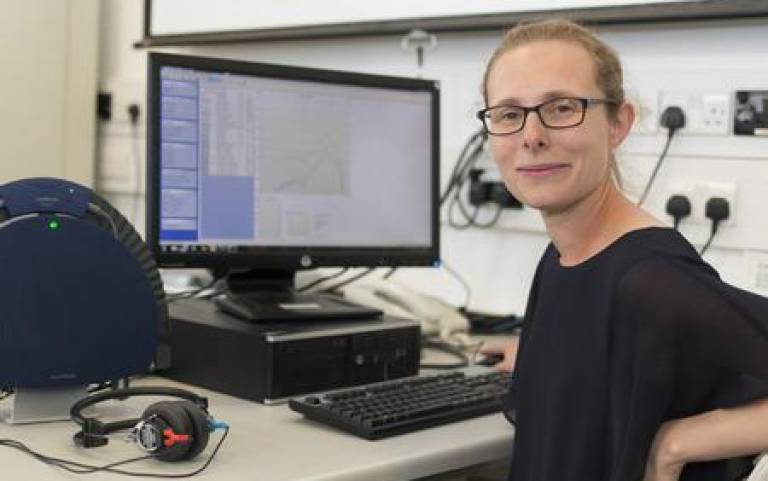Meet the expert: Dr Hannah Cooper

We caught up with Dr Cooper to ask her about her research, what excites her most about her work and what advice she would give her younger self.
What attracted you to the area of audiology and why is it important?
I was in the final year of my BSc at UCL and I wanted to do something that combined science and people. I didn’t know anything about audiology but I found out about it through the NHS Clinical Scientist Training Scheme and thought it sounded like my kind of thing! Hearing is fundamentally important for us to access spoken language and it’s the way most of us communicate and engage with people around us.
Many of us will know someone who is deaf or hard of hearing or will experience hearing loss ourselves. It’s the most common sensory loss and, currently, it is irreversible. But there are lots of things we can do as audiologists to help people to hear better, to help children to learn spoken language, and to help older adults to maintain relationships in their communities.
Can you tell us about your current research and teaching?
I’m currently leading a study to map the sound environments of deaf babies and toddlers. Hearing aids and cochlear implants help by amplifying speech sounds in quiet situations but they are less effective when there is background noise or when the sound of interest is at a distance of more than one-two metres.
For babies with hearing loss it is hard for them to notice the sounds that are further away from them and so they might miss out on learning about what those sounds mean. Remote microphone technology might help deaf babies to understand the sounds around them more effectively but we don’t currently know whether this is the case, or how best to use this technology with this age group. We have developed a series of questionnaires for parents of both deaf and hearing babies to fill in to help us find this out, and we will use the results to develop guidelines to support parents and professionals.
In terms of teaching, the pandemic has certainly been hard, but it has really challenged me to think about the way I teach and make greater use of different learning technologies. I know so much more about Moodle now than I ever did before!
What aspect of your work most excites you and why?
I love that my clinical, research and teaching roles all inform each other. It’s great to see translational research being implemented that can really make a difference to people’s lives. It’s a privilege to be able to work deaf children and their families and it’s amazing that I’m now seeing children in secondary school who I first saw when they were just a few weeks old!
It’s also really lovely to see students develop over their time with us. I particularly enjoy seeing students from our MSc Audiological Science with Clinical Practice programme (which trains science graduates to become registered audiologists) go from knowing very little about audiology to being competent and confident clinical professionals.
What's unique about the teaching at the UCL Ear Institute?
The Ear Institute is a great place to work and study, with a huge depth and breadth of research going on from mosquito hearing, to mouse hearing, to human hearing, and this is reflected in our teaching and research opportunities for students. We have a diverse student body with people coming to study with us from all over the world. This gives us all lots of opportunities to learn, not just about practice in the UK but internationally as well, and to make long-lasting relationships.
You are course director for the MSc in Advanced Audiology. What would you say to someone who is considering whether to study audiology at UCL?
I’d say come and join us! If you want a job that gives you a warm glow of satisfaction every day then audiology is for you. We are a small team so you will get to know us well. Whether you’re just starting out in your audiology career, or you’re a registered healthcare professional with years of experience, we have a course to suit you.
MSc Advanced Audiology is for qualified audiologists with some clinical experience. It’s a great course as it attracts a really diverse range of students, from people who have just a couple of years’ experience, to those who have worked in the profession for decades. This gives both students and staff a really great opportunity to learn from each other and to build relationships for the future, which is so important in a small profession such as audiology.
Can you tell us about your role as an inclusion lead within the Faculty of Brain Sciences?
I’m really keen to promote an inclusive environment at the Ear Institute so that students, staff and visitors feel welcome and respected. We have started to plan some initiatives to ensure and promote inclusivity, and we have two Connected Learning Interns joining us over the summer to look at accessibility for some of our courses that run on UCLeXtend. Hopefully their project will substantially improve our courses for students and delegates studying with us in the next academic year.
What’s the best advice you would give your younger self?
I would say it’s fine to take your time to find out what you want to do. Although I had a university place straight after sixth form I decided that it wasn’t the right time for me so I took a few years to do other things before starting at UCL as a ‘mature’ 23 year old. I think my younger self (and certainly one or two teachers from sixth form) would be rather surprised that I’m now a lecturer at UCL!
 Close
Close

